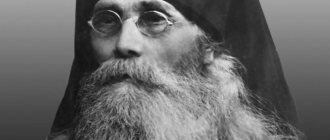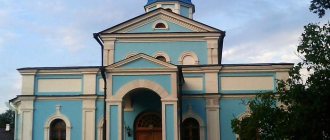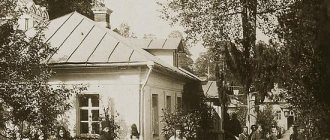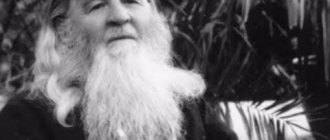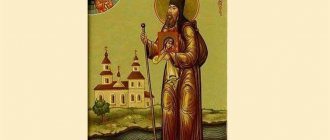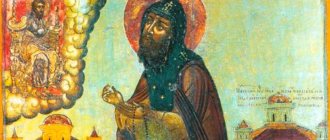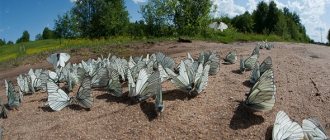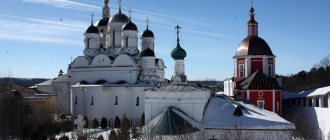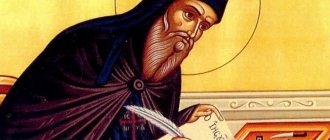| Jerome. Nikon (Belyaev) |
Nikon (Belyaev)
(1888 - 1931), hieromonk, Optina elder, confessor, reverend
Not to be confused with another new martyr of the same name, see Nikon (Belyaev)
Commemorated on June 25, in the Councils of the Arkhangelsk and Moscow Saints, the Council of the Optina Elders and in the Council of New Martyrs and Confessors of the Russian Church
In the world, Nikolai Mitrofanovich Belyaev, was born on September 26, 1888 in Moscow into a pious merchant family, the fourth of eight children.
From infancy his life was deeply providential. In the year of his birth, the Belyaev family was visited by Archpriest. John of Kronstadt, who blessed the young mother and gave her his photograph with his own signature. When Kolya was 8 years old, he fell ill with some kind of throat disease. Doctors declared his situation hopeless. Only the parents remained with the dying man. He was unconscious, then his breathing stopped. His mother continuously rubbed his cold body and, shedding hot tears, fervently prayed to St. Nicholas for help. The husband tried to persuade him not to touch the dead man, but Vera Lavrentievna, not listening to him, continued to rub him, shedding tears and praying. And - a miracle happened... The child sighed. Encouraged, the parents began to rub him together. Through the prayers of St. Nicholas, the Lord gave life to the child. Subsequently, the Optina elder Barsanuphius especially emphasized the providential significance of this incident.
Kolya was everyone's favorite. By nature he was endowed with a cheerful, lively and energetic character, and his distinctive feature was restraint and patience. He graduated from high school.
| Novices Nikolai (left) and Ivan Belyaev |
Over the years, Nikolai and his younger brother Ivan developed and strengthened a conscious desire for spiritual life.
They decided to go to a monastery, but did not know which one. They cut the list of Russian monasteries into strips and, after praying, pulled out a strip on which was written: “Kozelskaya Vvedenskaya Optina Hermitage.” At home they did not interfere with their decision, and on February 24, 1907, the brothers arrived in Optina. The Venerable Elder Barsanuphius received them both with love, but somehow made special mention of Nicholas. From the very first conversations, they felt an inexplicable close connection with each other, what is called “spiritual kinship.” On December 9, 1907, the Belyaev brothers were accepted into the monastery brethren.
On January 29, 1908, Nikolai was enrolled as a novice.
In February 1908 he was appointed assistant librarian. He willingly and cheerfully carried out everything assigned to him. With an equally joyful face, he worked in the refectory: he swept away snow, carried firewood, washed dishes, swept the floor. In the church he was an assistant sexton. He worked in the garden: carried manure, dug, planted. Spoiled and raised almost in luxury, unaccustomed to physical labor, he was not burdened by anything.
In October 1908, he was appointed clerk to Elder Barsanuphius and was released from all obediences except church singing and reading. By this time, he became the closest disciple and companion of Elder Barsanuphius, who, foreseeing his high destiny, prepared him to be his successor, passing on to him his spiritual and life experience, and guided his spiritual life.
In 1910, Elder Barsanuphius had to endure unjust persecution and transfer from the monastery to the Kolomna Staro-Golutvin Monastery. Nikolai had a hard time being separated from his beloved elder.
In April 1910, Nikolai was tonsured as a ryassophore
On April 1, 1913, Elder Barsanuphius died. Nikolai was unable to attend the burial: he lay bedridden with a serious illness.
On May 24, 1915, he was tonsured into the mantle and named in honor of the holy martyr Nikon (September 28).
| Jerome. Nikon (Belyaev) |
On April 10, 1916, he was ordained a hierodeacon, and on October 3 or November 3, 1917, to the rank of hieromonk.
During his subsequent life in the monastery, he served as an example of unconditional obedience, unfeigned humility, peace, firmness and wisdom. He was serious beyond his years, thoughtful and at the same time joyful.
After the October coup, Optina Pustyn was closed and persecution began. Able-bodied monks created an “agricultural artel” that provided food. It was hard in Optina, but services in churches continued.
September 17, 1919 Fr. Nikon was arrested without charge. He was imprisoned in Kozelsk prison. After some time he was released.
During revolutionary times, the monastery experienced great financial difficulties. Father Nicholas worked zealously, showing administrative abilities and trying to preserve the monastery.
In 1923, the monastery was turned into a museum. All the monks, with the exception of twenty workers at the museum, were ordered to leave. Rector Fr. Isaac (Bobrakov), having served the last cathedral liturgy in the Kazan Church, handed over the keys to Fr. Nikon, blessed to serve and receive pilgrims for confession. At the same time, Fr. Nektary began to direct his spiritual children to Fr. Nikon. Before this, Hierom. Nikon did not dare to give advice to those who turned to him, and when he began to receive people, when giving advice, he always referred to the words of the Optina elders.
On June 15, 1924, the Kazan Church, the last of the remaining Optina churches, was closed; in the same month, Fr. Nikon was evicted from the monastery and settled in Kozelsk, serving in the Assumption Church.
| Reverend Confessor Nikon (Belyaev) |
On June 16, 1927, he was arrested along with his father Kirill (Zlenko) and Fr.
Agapit (Taube), was imprisoned in Kaluga prison. He was involved in the group case “the case of Hieromonk Nikon (Belyaev) and others. Kozelsk, 1927.” On December 19, 1927, by a Special Meeting of the OGPU Collegium, he was sentenced to three years of camp imprisonment. The stage was sent on January 27, 1928, in March it arrived in the city of Kem. Communication with Solovki was interrupted due to a cyclone, so all prisoners were placed in the Kemperpunkt camp, where he worked as a warehouse guard (due to illness, he was released from heavy physical work ).
From April 1929 he worked as an accountant in the office of the Solovetsky camp.
At the end of his sentence on May 22, 1930, he was sentenced to exile in the Arkhangelsk region. Before being sent, the doctor found that the Monk Nikon had a severe form of pulmonary tuberculosis and advised him to ask for a change in place of exile. Accustomed to doing everything for obedience, priest. Nikon asked for advice from Father Agapit, who was exiled with him. He advised not to resist God’s will, and Fr. Nikon resigned himself.
On August 16, 1930, he was moved from Arkhangelsk to the city of Pinega. Sick, he wandered for a long time in search of housing until he reached an agreement with a resident of the village of Voepola. In addition to the high pay, she demanded that the priest, as a farm laborer, do all the hard physical work. The health of the Monk Nikon worsened every day, he was malnourished. One day, due to overwork, he was unable to get up. And then the hostess began to drive him out of the house.
Father Peter (Drachev), also an exiled Optina resident, transported the dying man to his neighboring village and looked after him there. In the last months of his illness, Fr. Nikon received Holy Communion almost daily.
Died on July 8, 1931. On the day of his death, he took communion and listened to the canon on the outcome of the soul. The face of the deceased was unusually white, bright, smiling joyfully at something. Twelve people gathered for the burial of the clergy alone. He was buried in the monastic order in the cemetery of the village of Valdokurye.
On the day of the death of St. Nikon, the Optina monks, starting on July 8, 1989, served funeral services at his resting place in the cemetery in Valdokurye.
On March 30, 1995, he was rehabilitated due to the 1927 repressions.
Canonized on July 26, 1996 by the act of Patriarch of Moscow and All Rus' Alexy II.
In 2022, his name was included in the list of the Cathedral of Saints of the Archangel Metropolis [1].
Life of Nikon Optinsky
Nikon's father's real name is Nikolai Belyaev. He was born in 1888 in Moscow into a merchant family. Nikolai's parents had 8 children. The Belyaevs lived amicably, piously and richly. The head of the family, Mitrofan Belyaev, believed in God, although he did not delve into the depths of Christian teaching. Nikolai's mother, Vera, was the daughter of a merchant and church elder Lavrenty Shvetsov. The Belyaev family loved church services and kept God's commandments.
Nikolai grew up as a cheerful and mischievous boy. He studied at one of the Moscow gymnasiums and read a lot. As a teenager, I began to think about what business to devote my life to. Nikolai’s soul yearned for God, and worldly vanity seemed uninteresting to him. After graduating from high school, he entered Moscow University at the Faculty of Physics and Mathematics. True, I didn’t study for long.
Nikolai came to the university in the morning, and after 9 o’clock he ran away from lectures and went to listen to a church service in the Kazan Cathedral. Returning to his place, he went into the chapel of the Savior and prayed to God. At home, instead of university books, Nikolai read the Gospel. In February 1907, he decided to leave the university and go with his brother Ivan to a monastery. Mother, Vera Lavrentievna, did not hold back her sons, because she knew that, having become novices, they would only encounter godly deeds.
Nikolai and his brother Ivan went to Optina Pustyn. On February 24, 1907, the young men arrived at the monastery. The brothers enjoyed living and praying in the monastery. However, the abbot decided to send the young men back home. In December 1907, Nikolai and Ivan returned to the monastery. Hegumen Barsanuphius allowed the brothers to stay in Optina Hermitage. A year later, Ivan and Nikolai put on novice clothes. Hegumen Barsanuphius became the spiritual father of the brothers. The elder singled out Nicholas and made him his secretary. The young novice spent a lot of time with the old abbot, talking with him on various topics.
In 1910, Nicholas was tonsured into the ryassophore. Hegumen Barsanuphius predicted possible trials and even illnesses for the newly tonsured man to overcome in connection with spiritual rebirth. Nicholas humbly performed his monastic duties. In 1915 he was tonsured and named Nikon in honor of the Great Martyr Nikon. In 1916 he became a hierodeacon, and in 1917 a hieromonk.
Neither Bolshevik persecution, nor prison, nor the fear of being shot could force Father Nikon to leave the righteous path and leave monasticism. The hieromonk remained in Optina Hermitage until its closure. In 1919, Nikon's father was arrested for the first time, and another arrest soon followed. Upon his release, the hieromonk lived for some time in Kozelsk, serving in the Assumption Church. In 1927 he was arrested again. In 1930, Nikon’s father was sent to settle in the Arkhangelsk region.
The elder fell ill with tuberculosis, and in 1931, at the age of 43, he died. The body of the hieromonk was buried in the rural cemetery of Valdokurya near the village of Pinega in the Arkhangelsk region. In the 30s of the last century, Nikon’s grave was desecrated, so the remains of the priest were reburied by believers.
Eldership – Optinskaya salt
The external history of the Vvedenskaya Optina Hermitage, which became famous precisely for its eldership, was initially similar to the history of many other small monasteries of Ancient Rus'. Founded, according to legend, in the 14th century, this monastery was completely destroyed by Polish troops during the Time of Troubles. It took about two decades for the monastery, which had recovered from the devastation, to resume prayer work and improve the monastic economy.
The flourishing of Optina in the 19th century is connected, firstly, with Paisius’s movement towards the revival of genuine monastic life and the tradition of eldership, and, secondly, with the efforts of outstanding archpastors of that time, caring about the strengthening of true monasticism in Russia. Historical conditions also favored this, since during the reign of Emperor Alexander I the attitude of the supreme authorities towards monastic monasteries and the monks themselves began to gradually change.
Photo: monasterium.ru
Metropolitan Platon of Moscow (Levshin, 1775–1812), who worked a lot in the field of establishing monasteries in his diocese, drew attention to this hermitage, picturesquely located on the banks of the Zhizdra River.
He instructed Archimandrite Macarius (Bryushkov), abbot of the Peshnoshsky Monastery (1788–1811), to put Optina in order. Archimandrite Macarius, who was in correspondence with Elder Paisius (Velichkovsky), began the restoration of Optina, sending there the monk Abraham, who later became rector (1796–1817).
At this time, in the forests of the Smolensk province, 40 versts from the city of Roslavl, a community of hermits labored, glorified by the names of the famous elders, disciples of the Monk Paisius (Velichkovsky).
Photo: monasterium.ru
On June 6, 1821, fulfilling the will of St. Philaret (Amphiteatrov, the future Metropolitan of Kyiv), the Roslavl hermits, led by the monk Moses (Putilov), arrived in Optina Hermitage to set up a monastery. Thus, thanks to the Paisian monastic tradition that received registration here, the famous Optina eldership was established.
Truly, eldership is the very salt of Optina, the highest achievement of the life of the Church, the flower and crown of its spiritual achievement! Like the prophets of the apostolic times, the Optina elders were distinguished by the highest of all gifts - the gift of prudence, as well as foresight, the gifts of healing and miracles.
It is difficult to say with certainty whether there has been a place in Russia throughout its history where human society has come so close to the ideal of Christian relations. Nowhere did the holy brotherhood, numbering about three hundred people, have such an extensive sanctifying influence on its people as in Optina. Here a life was born full of suffering for the fate of Orthodoxy, for the idea of improving society in the union of people with God and the state with the Church, on which great Russia was built. Salvation was not seen in the search for new paths, but in firmly remaining in the faith in which the Optina elders lived and acted - the true acquirers of the gifts of the Holy Spirit and the guardians of the patristic heritage.
Photo: monasterium.ru
If the Monk Leo (Nagolkin) seemed to come out of the monastery fence towards the common people and established the first contact with the world, then the Monk Macarius laid the foundation for a deep connection between monasticism and the intelligentsia. It was under him that Optina became an important part of not just the spiritual, but also the cultural life of Russia. For many decades, Elder Ambrose remained a kind of symbol of Optina for all of Russia. Thousands of Russian people sought conversations with him, his consolation and advice.
The tradition of the Optina eldership, begun by Father Lev, who arrived at the monastery in 1829, ended on July 8, 1931 with the departure of the venerable confessor Nikon (Belyaev) to another world. Despite his young years, Father Nikon became the last Optina elder who spiritually cared for monastics and laity until the complete destruction of the holy monastery.
One hundred years of amazing, truly apostolic preaching - the loudest and most active ministry. Is it a lot or a little?
Today, on the day of the 90th anniversary of the righteous death of the last elder of “old” Optina, we will prayerfully venerate his holy relics and remember his earthly life, which was destined to become a life.
Photo: monasterium.ru
Proceedings
Nikon Optinsky left behind “The Diary of Novice Nikolai Belyaev,” that is, a description of his life in the Optina Hermitage for three years (from 1907 to 1910). Records of some of his sermons, instructions, and letters have survived to this day.
In 1922, the hieromonk wrote to his mother from Optina Hermitage. In the letter, he confessed that he was ready to suffer for his faith, but would not renounce God. Another work of the elder has been preserved - “The Teachings of Hieromonk Nikon”, his instructions to his descendants, Christians. In 1924, one of the believers recorded “Conversation after the Vigil” with Father Nikon. Father always gave advice and instructions to Christians, taught them how to live in harmony with God.
In the recorded sermon “The Call of God,” the hieromonk asks Christians to heed the voice of God calling to churches and to pray to the Savior. The Weekly Word on Zacchaeus tells the story of a tax collector who changed his life after talking with the Lord. The reflections on the topic “In the ten-stringed Psalter I sing to You” talk about the importance of preparing for the perception of spiritual knowledge.
Elder Cross
Photo: monasterium.ru
On May 24, 1915, Nicholas was tonsured into a mantle with the name Nikon in honor of the holy martyr, remembered by the Church on September 28; On April 10, 1916, he was ordained a hierodeacon, and on November 3, 1917, he became a hieromonk.
After the revolution, the new government closed the monastery and dispersed some of the brethren. The remaining monks were allowed to create an agricultural artel. Father Nikon tried to preserve the monastery until the last moment.
On September 17, 1919, his first arrest followed. Father Nikon was imprisoned in Kozelsk, but after some time he was released, and he returned to Optina.
Over the next four years, the head of the monastery, schema-abbot Theodosius, Elder Anatoly (Potapov) and Elder Nektary (Tikhonov) died. The authorities closed the agricultural artel “Optina Pustyn”, leaving only the Kazan temple for worship. The rector of the monastery, Archimandrite Isaac, before he was expelled from the monastery, blessed Father Nikon to serve in the Kazan Church and accept everyone who came to confession. So the 34-year-old hieromonk unexpectedly fell under the cross of eldership.
Photo: monasterium.ru
After the closure of the Kazan Church, Father Nikon moved to Kozelsk, where he served in the Assumption Cathedral until his arrest on June 16, 1927. His pastoral activities and growing popularity were well known to the authorities. But Father Nikon was ready for anything, and he met the uninvited guests who came to arrest him with imperturbable calm.
Photo: monasterium.ru
On February 9, 1928, he left his native Kaluga land forever. In March the stage arrived in Kem. Due to the cyclone, which interrupted communication with Solovki, Father Nikon was left at the Kem transit point. In April 1929, he was transferred to Popov Island in the Karelian Republic, where he worked in the camp office. After staying in the camp for a little over two years, Father Nikon was assigned to “free exile” to the city of Arkhangelsk. Due to pulmonary tuberculosis discovered in him, the place of exile was changed to Pinega (now an urban-type settlement) in the Arkhangelsk region. After a year of wandering, the Lord determined the last refuge of the righteous. On Lazarus Saturday, the exiled Optina hierodeacon Father Peter (Drachev) transported Father Nikon to the neighboring village of Valdokurye.
Photo: monasterium.ru
However, the cruel illness did not let go of the sufferer and developed very quickly. The weakness increased to the point that by the end of May Father Nikon was already lying down all the time, performing the monastic rule from memory.
Photo: monasterium.ru
The last days of his dying father Nikon were brightened up with her cares by one of his spiritual daughters, a former Shamorda novice, nun Irina Bobkova, who specially came from Moscow to say goodbye to the elder. She witnessed a vision that he had four days before his death. Before his death, he saw the Optina elder Macarius, who came to confess him. “Not knowing what to think, she went to the other half of the house, from where the priest’s voice seemed to sound for an eternity, and she was afraid to hear the words of this mysterious confession.”
In a foreign land, amid suffering, on July 8, according to the new style, the earthly life of the last elder of the Optina Monastery, Hieromonk Nikon, ended. Until his death, he wrote notes to his spiritual children. Here is the text of the last of them: “What beauty there is in spiritual books...” It remained unfinished.
Photo: monasterium.ru The Lord granted His servant a peaceful Christian death and, upon his repose, honored him with a burial appropriate to his rank and merits. Many exiles came to see the priest off on his final journey. There were twelve clergy alone. Despite the fact that they were all at work sixty kilometers from Valdokurye, they suddenly got a day off - “as if they were released for his burial.
The house where the venerable confessor Nikon died has survived to this day. This is the only surviving house in the Kozlovo area. On July 8, 1989, the first funeral service was performed over the restored grave of St. Nikon. It was served by Hieromonk Theophylact, a resident of the revived Optina Hermitage, who arrived in Pinega.
Photo: monasterium.ru
In 1996, the Monk Nikon was canonized among the locally revered saints of Optina Hermitage, and in August 2000, by the Jubilee Council of Bishops of the Russian Orthodox Church, he was glorified among the other fourteen fathers of Optina Hermitage as saints.
Spiritual instructions of St. Nikon of Optina
The “Teaching of Hieromonk Nikon”, recorded by him for posterity, has been preserved. The Optina elder bequeathed to believers to read the Holy Gospel and teach God’s commandments. The teachings of Christ, according to the priest, should become a reference book for any Christian. Each of your actions must be checked against the commandments from the Gospel.
The main character trait of any Christian should be humility. A person is obliged to submit to the will of God, to meekly accept everything that is prepared by fate. Christians must live a life full of sorrow, sorrow, and difficulty. Every believer is obliged to bear his cross. A Christian's life in accordance with God's law is only a preparation for entering the Heavenly Kingdom.
Throughout his life, a believer must come to confession with his confessor. A person who regularly confesses cleanses his heart from everything displeasing to God. Believers are able to hear the words of the Lord, but first they need to rid their souls of all evil.
A short list of the elder’s instructions:
- learn the commandments of God and live according to them;
- fight your sinful desires, keep yourself from temptations;
- submit to the will of the Lord;
- love God more than anything else;
- read the works of the holy fathers;
- have the fear of God;
- prepare for sorrow, patience;
- pray correctly;
- regularly repent of sins and confess.
A Christian must believe in God, live in humility, show mercy, forgive neighbors for insults and insults. Believers are obliged to pray to the Savior daily, glorify the Lord, and thank him for life.
Childhood and youth
Nikolai Belyaev was born on September 26 / October 9, 1888 in the Moscow merchant family of Mitrofan Nikolaevich and Vera Lavrentievna Belyaev. In total they had eight children - two daughters and six sons, Nikolai was the fourth child. The Belyaevs’ house was rich; according to the elder’s recollections, his childhood was spent almost in luxury; they did not need anything. By tradition, the family was pious, but the father was more interested in performing rituals, loved the external beauty of the church service, without delving into the depth of Christian doctrine. Such outward piety was characteristic of many Russian families at that time, although even this was already becoming a rarity, giving way to complete indifference to faith and the Church.
Nikolai’s maternal grandfather, Lavrenty Ivanovich Shvetsov, was distinguished by deep faith and true piety. He was an orphan, and while still a boy he was picked up by a wealthy merchant and assigned to work in his shop. The merchant, who had no heirs, fell in love with Lawrence so much for his religiosity, conscientiousness in service and decency that over time he transferred his business to him. Lavrenty Ivanovich became rich, he was engaged in trade all his life, his main principle in conducting business was crystal honesty, he often repeated: “Another penny brought into a house, like a fire, will burn it down.” Lavrenty Ivanovich rejected any deceit in business, the principle “if you don’t deceive, you don’t sell,” he testified: “In my entire life I have never deceived anyone even once, and my business always went better than others.” Lavrenty Ivanovich loved worship, sometimes he himself sang in the choir. For thirty-three years he was the elder of the Church of Saints Equal-to-the-Apostles Constantine and Helen in the Kremlin, in which the miraculous icon of the Mother of God “Unexpected Joy” was located. His religiosity was passed on to his daughter. Everyone recalled that Vera Lavrentievna was distinguished by her prayerfulness, kindness, and even, patient character. Mitrofan Nikolaevich, after marrying Vera Lavrentyevna, began serving with her father, and over time the whole family moved to the Shevtsovs’ house on Bolshaya Ordynka. Elder Nikon recalled that he was the favorite of his grandfather and grandmother and was very attached to them. The death of his grandfather and then his grandmother, Maria Stepanovna, was the first shock in his life.
Since childhood, Nicholas was accompanied by significant events. In the year of his birth, Father John of Kronstadt visited the Belyaevs, he talked with Vera Lavrentievna and gave her his photograph with a memorial inscription, which was kept in the family as a relic. When Nikolai was five years old, he became seriously ill; doctors said that he would not recover. But the mother did not lose hope; she fervently prayed to St. Nicholas the Wonderworker for her son’s recovery. And a miracle happened: the disease left the child. Subsequently, Elder Barsanuphius said this to Nicholas about this event: “Of course, this is an extraordinary case. Actually, it’s not a coincidence, because everything happens to us purposefully... You were given life. Your mother prayed, and St. Nicholas the Wonderworker prayed for you, and the Lord, as the Omniscient, knew that you would enter a monastery, and gave you life. And believe that you will remain a monk until the end of your life...”
Nikolai stood out among the children for his cheerfulness and liveliness, he was a leader in games, but with this he was combined with such character traits as endurance and patience. The wealth and prosperity that reigned in the house did not make his heart indifferent to the pain of others. The elder later recalled on the pages of his diary: “I remember we had a Christmas tree: children’s fun, sweets, the sparkle of decorations - all this made me happy. But I remember well one evening. I'm alone near the Christmas tree. The room is twilight, the lamp is on, and the shadow of the Christmas tree falls on most of the room. And this is the thought in my head: I’m fed, dressed, my parents consoled me with a beautiful Christmas tree, I’m eating candy, the room is warm... But there are, I know, children who don’t even have what they need. There is no question of a Christmas tree: they are half-naked, begging in the cold, or sitting hungry in cold basements...”
Prayer and troparion to the saint
Believers pray to the holy elder, asking him to intercede for them before the Lord, to ask God for forgiveness for their sins. Nikon of Optina earned the Kingdom of Heaven from the Savior, because he endured all the torment, did not renounce Jesus, and preserved the Christian faith. In the troparion, believers ask the holy elder to remember them in prayers to the Lord. Christians glorify Father Nikon for his life and suffering in the name of Christ.
Prayer to Nikon
Oh, sacred Nikon, oh our reverend father, the bright crown of the eldership of Optina and the fragrant flower of the new Russian martyrs! You first cleansed your soul with fasting labors, you put the demonic militia to shame, by obedience, as if by a fleeting ladder you reached the heights of virtues and the blessed confessor of faith appeared. In the time of godless persecution, you courageously clothed yourself with patience, and like a good shepherd and like a true son of the elders of Optina, you accepted and consoled the suffering people. For this reason, you endured many sorrows from those who fought against God and you were condemned to exile, but just as then you did not separate from your flock in spirit, but you have well preserved the shepherd flute of your prayers for your sheep, and now, do not depart from your children in your spirit, but ever Stay with us, may we be strengthened by you, may we truly preserve the faith and may we fully fulfill the covenants of the Optina elders.
Above all, pray to our All-Blessed Lord Jesus Christ, may He establish our Church, Fatherland and people in Orthodoxy, may He preserve monastic monasteries, faithful to the monastic vow, may He grant us forgiveness of sins and true repentance, and having been purified by this, we will love the only thing we need: to cleave To Christ our God and Savior with all our heart, with all our thought, with all our will and with all our feeling, loving nothing from the lusts of this world and thus freeing ourselves from the snares of the ruler of the darkness of this age, in humility let us sing and glorify the all-holy name of the Father and the Son and the Holy Spirit, now and ever and ever forever and ever. Amen.
Prayer to St. Nikon, written in Pinega
About our venerable father Nikon, confessor of Christ. To you, as a quick helper and a warm prayer book, we resort to weakness and unworthiness and earnestly pray: according to the grace given to you from God, help us to do the will of the Lord in humility, to firmly maintain the Orthodox faith and are worthy of your prayerful intercession to God from us even at the hour of death protect us with your prayers. Be a strong intercessor for the Pinezh region of the Russian country, and through your intercession we will be worthy of the promised Kingdom of Heaven; Pray, servant of Christ, the all-good God to grant us forgiveness of all the sins we have committed, from youth to the present day and hour, in deed, word and thought, and grant us unrestricted entry into the Kingdom of Heaven, so that together we may glorify with you the Father and the Son and the Holy Spirit forever centuries. Amen.
Troparion to the Holy Reverend Confessor Nikon, Elder of Optina, voice 2
Standing before the Throne of God, / as one of the elect, / remember in your holy prayers / us unworthy, / who honor your memory, / Our Father Nikon, of ever-memorable.
The origins of Russian eldership
The eldership, preserved today mainly on Mount Athos, has existed since ancient times in the monasteries of the Orthodox East. It was never introduced from above by the authority of the bishop, and this is impossible, but grew by the will of God from the very practice of monastic ascetic life and monastic discipline.
A spiritually experienced elderly monk, who was not always a priest or confessor in the exact sense of the word, with the blessing of the abbot or with his permission, monitored the spiritual and moral growth of the novices, guided them, using various forms of spiritual education, so that the novices did not shy away from the true path of salvation and did not fall into various kinds of sins and spiritual temptations.
Photo: monasterium.ru
In Rus', eldership fully manifested itself only in the post-Mongol period. In the 16th century, the Monk Nil of Sorsky, having personally become acquainted with the way of life of the Athonite monks, was the first to found a monastery in Russia based on the model of Athonite desert habitation. The hermitage way of life presupposed the presence of spiritual mentorship and eldership.
The tradition of desert living continued uninterrupted until the church schism of the second half of the 17th century. The most courageous and zealous monks went to remote places, first to monasteries at monasteries, and then to impenetrable forests. Removal from the world, vanity and wickedness revived the fading monastic spirit.
After the church schism, strict measures to combat hermits practically led to the eradication of hermit-dwelling in Rus'. Under these conditions, even correct desert living and eldership undertaken with a spiritual purpose became almost impossible and were stopped for a while. Many zealots of monastic exploits began to go abroad to Moldavia, Wallachia and Mount Athos. However, wars with Turkey during the reign of Catherine II forced Russian monks to return to their Fatherland. Desert living again took root on Russian soil. The Bryansk and Roslavl (Smolensk province) forests became the center of monastic exploits and eldership in the second half of the 18th century. Russian immigrants from Mount Athos and Moldova settled here, most of whom were disciples of St. Paisius (Velichkovsky).
Photo: monasterium.ru
Elder Paisios, who spent many years in monastic endeavors on Holy Mount Athos, later led monasteries in Moldova. He laid the foundations of monastic life, which spread throughout numerous Russian monasteries and forest hermitages.
